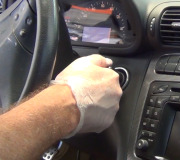Thicker oil is not the answer. That will reduce how quickly parts start to be lubricated when the engine is started. It also makes the engine harder to start in cold weather.
One quart in 1000 miles is not real serious. The first thing to be aware of is all newer engines use some oil, and to address that concern, almost all dip sticks in the last 15 - 20 years are marked with "Min" and "Max" instead of "Add" and "Full". As long as the level is above the "Min" mark, you don't have to add any. Of course you don't want to start at that level at the oil change. When you add the number of quarts specified for an oil change, the level will usually be about 3/4 of the way to the maximum mark. If you're trying to keep the level at the highest mark, you ARE going to think your engine is using too much oil. It's not going to stay at the highest mark.
To find out where that oil is going, you can add a small bottle of dark purple dye to it, then search a few days later with a black light. Auto parts stores have the dye, and those that rent or borrow tools will usually have the light. The dye will show up as a bright yellow stain that you can follow back to the source. Since you haven't seen any leaks near the engine, the most likely place to see the dye is inside the tail pipe. That would point to valve guide seals or piston rings. Valve guide seals most commonly cause blue smoke from the tail pipe when the engine is first started, and relatively little or no smoke once it is warmed up.
Pistons are made now with lower tension to reduce friction and improve fuel mileage, but the trade-off is that increased oil consumption. Blame the politicians and environmentalists for that. We burn a little less gasoline, which can be cleaned up very effectively in the exhaust system, and burn more oil which adds to pollution, ... And everyone is happy. That's what happens when politicians make laws for things they don't understand.
Saturday, January 11th, 2014 AT 5:22 PM


